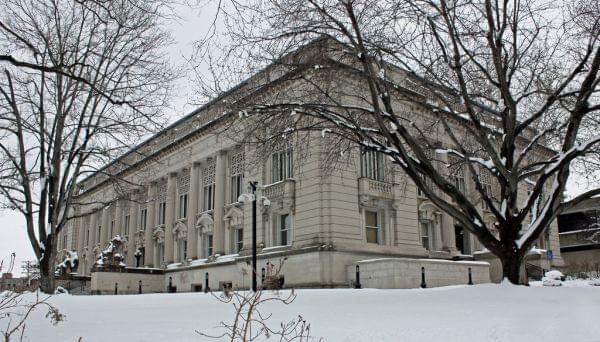Fired Prisoner Review Board Member Asks Illinois Supreme Court To Limit Governor’s Power

The Illinois Supreme Court building in Springfield. myoldpostcards/Flickr (CC BY-NC-ND 2.0)
Fired Prisoner Review Board member Eric Gregg is asking the Illinois Supreme Court to give him his job back. In a case argued Tuesday, the justices were also asked to consider the limits of a governor’s power to fire certain state officials.
Two years after Gov. Pat Quinn appointed Gregg, then the mayor of Harrisburg, the Rauner administration got wind of complaints Gregg had misstated income on a bankruptcy filing and failed to disclose an expensive gift on an economic interest form.
Gregg argues the complaints against him were misunderstandings — that the bankruptcy discrepancy was a filing error, and that the gift was received after he’d filled out his statement of economic interest.
Nevertheless, Rauner fired Gregg, who then sued to get his job back.
The governor clearly has the power to appoint members of the Prisoner Review Board; at issue is whether he also has the power to remove them.
The Prisoner Review Board determines whether certain long-serving prisoners can be released on parole and sets conditions for release, among other duties.
Gregg’s lawyer, Tom Crosby, says those unique responsibilities mean board members must be able to operate independently of the governor’s influence.
He asked the justices what would happen if a future governor campaigned on not letting any prisoner out early.
“Could a member of the Prisoner Review Board, with that Damocles sword hanging over his head, make an independent determination — knowing that to do so, he could arbitrarily be removed?” Crosby asked.
But Illinois Solicitor General David Franklin, representing the state, told the justices that because the board is a confidential advisor to the governor on matters like clemency, its members must serve at his pleasure.
“It’s impossible I think to think of a subject that lies closer to the heart of the governor’s executive discretion than pardons and commutations,” Franklin said.
There’s no timeline for when the justice might issue an opinion. The case is Gregg v. Rauner, No. 122802.
